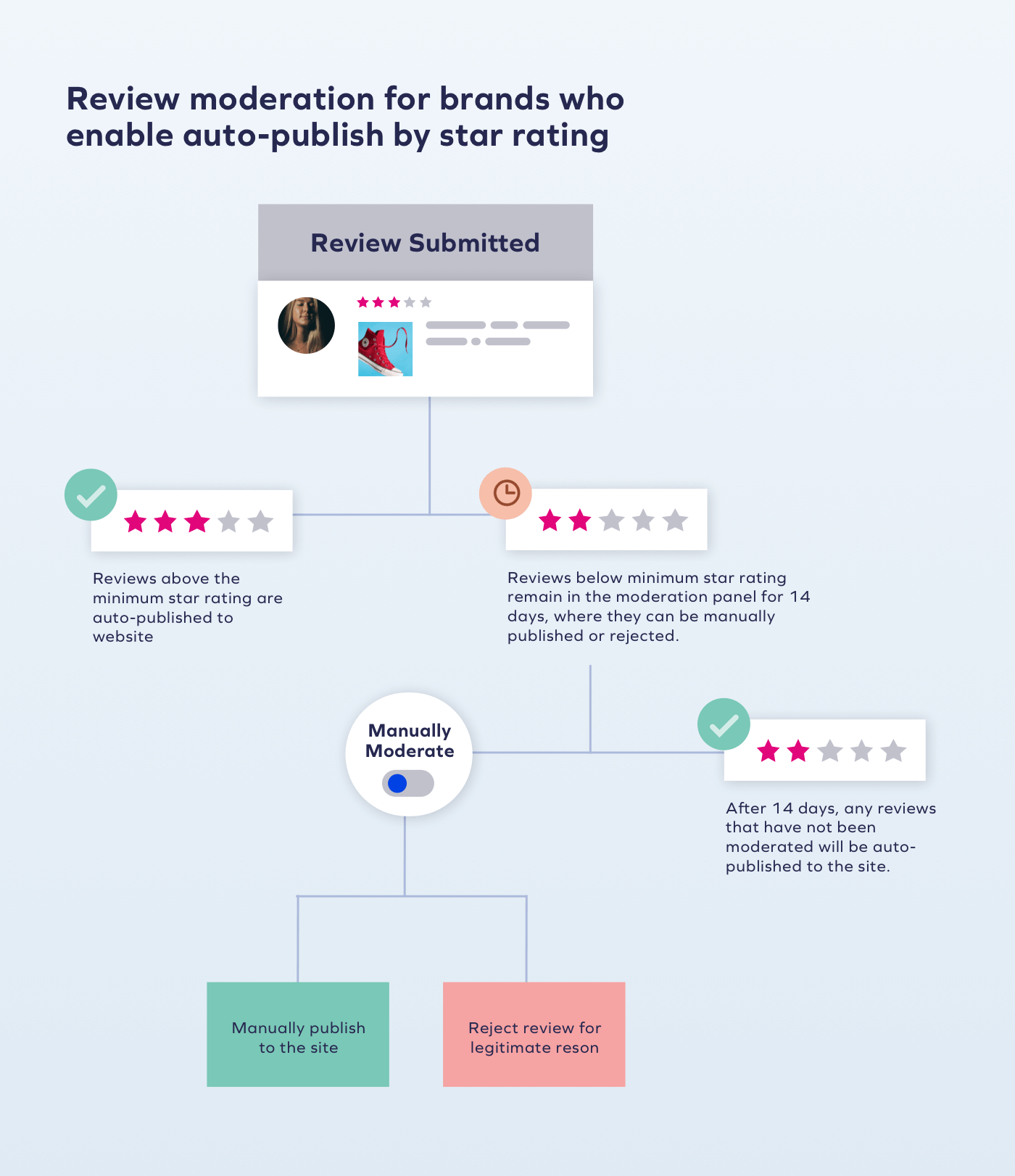This blog post has been updated.
We talk a lot about the importance of authentic reviews here at Yotpo, and how brands should publish all of their reviews, even the bad ones.
To ensure that we’re creating a compliant environment for brands and a trustworthy experience for consumers, we wanted to remain transparent by showcasing the Federal Trade Commission’s (FTC) updated rules on publishing and moderating reviews.
Fair review practices
The FTC has published a new, final rule on best practices for collecting and moderating customer reviews as it relates to marketers and review platforms. These final rules align closely with the guidelines for moderating reviews that Yotpo has encouraged for years based on prior, non-binding guidelines from the FTC. Keep in mind that if your brand partners with an influencer or celebrity to talk about their experience with your product, this may be consider a “celebrity testimonial” and subject to the same rules as any other review.
The full text of the rules can be found here. The general rules for sellers on collecting reviews include:
Collecting reviews
The general guidance for marketers on collecting reviews includes:
- Do not create reviews and attribute them to people who do not exist (§ 465.2(a)(1))
- Do not ask for reviews from those who haven’t used your product or services (§ 465.2(b)(2))
- Disclose whether your staff, family, or friend has written any reviews. Otherwise, do not include their review on your site (§ 465.2(c), .5(c))
- Do not buy positive (or negative) customer reviews (§ 465.4)
- Use caution when offering incentives for reviews as there should be no conditions attached to the incentive for the review. If the reviewer has any connection to the product or service and/or if they received any kind of compensation for their review this should be disclosed (§ 465.5)
- Do not ask for reviews from customer you believe will only leave positive ones (§ 465.7)
In order to further promote transparency while moderating reviews, the FTC encourages brands to:
- Publish all reviews — both positive and negative (§ 465.7)
- Display reviews in a way that is fair; positive reviews should not be made more prominent than negative ones (§ 465.7)
- Identify fake or misleading reviews after they’ve been published. Then, determine whether they should be removed or kept (but label as fake/suspicious) (§ 465.7(b))
Yotpo shares the belief that showing both good and bad reviews on-site is a key factor in creating an authentic buying experience and promoting consumer confidence. Because of this, our moderation practices were crafted to ensure alignment with FTC guidelines.
We’ve worked to design a moderation process that is fair, yet maintains the brand’s control over the content as long as reviews are rejected over legitimate reasons and in a timely manner.
This ensures that the brands working with Yotpo have access to the best moderation practices, and that they are applying moderation practices aligned with the guidelines of the regulator. Remember the key to FTC compliance is to publish all reviews (with a few exceptions we detail below) as quickly as possible.
Yotpo moderation practices
Our moderation process only affects brands who use the Auto-Publishing Reviews feature. When auto-publish is enabled, reviews submitted by your customers are automatically published to the Reviews Widget on your site. Generally, you can choose to publish all reviews right away, or only publish reviews with a minimum star rating.
Brands who choose to raise the star rating filter above 1-star will need either publish or reject reviews that fall below the minimum rating. To comply with rule § 465.7 of the FTC regarding review suppression, reviews should only be rejected for an appropriate reason as outlined below, otherwise the FTC may view rejections as unlawful review suppression.To encourage compliance with this rule, Yotpo will automatically publish all reviews that have not been acted upon within 14 days.
Here’s what the moderation flow looks like:

When can brands reject a review?
There are a limited number of legitimate reasons where a brand can reject a review from appearing on their website. The FTC in rule § 465.7 says that brands are within their rights to reject reviews that contain:
- Trade secrets or privileged or confidential commercial or financial information
- Defamatory, harassing, abusive, obscene, vulgar, or sexually explicit content
- The personal information or likeness of another individual
- Content that is discriminatory with respect to race, gender, sexuality, ethnicity, or another intrinsic characteristic
- Content that is clearly false or misleading
- A seller can also reject a review if they believe the review is fake or “the review is wholly unrelated to the products or services offered by or available at the website or platform.”
Yotpo creates the most trustworthy experiences for consumers and brands alike. Sharing positive and negative reviews on-site is crucial to creating a more authentic experience for your customers.
Why brands should publish all relevant reviews
Keep in mind that bad reviews aren’t necessarily bad for business. Consider the stats:
- 53% of consumers specifically seek out bad reviews for one or more products they’re interested in.
- Consumers trust reviews more when they see a mix of good and bad feedback. If the feedback is entirely positive, 95% believe the reviews are fake or screened by the company.
- 68% of shoppers trust reviews more when they see both positive and negative content.
Publishing all of your reviews — including the negative ones — benefits both brands and consumers. For brands, it helps to boost authenticity and overall consumer confidence. For consumers, it means making better-informed purchases from a brand they trust.
Yotpo customers can rest assured that their review provider reflects the latest rules from the FTC. These changes to Yotpo’s moderation process help brands leverage the full power of customer reviews, while enhancing shoppers’ trust in brands. Remember, the FTC rules apply to business conducted in the United States, other areas may be subject to different rules such as the European Union’s Omnibus Directive 2019/2161. To learn more about our moderation practices, see our support article here.














 Join a free demo, personalized to fit your needs
Join a free demo, personalized to fit your needs